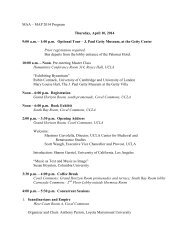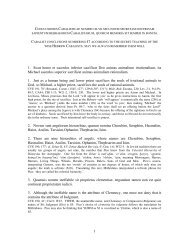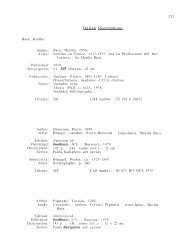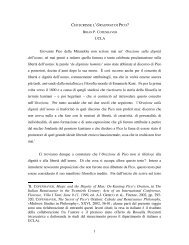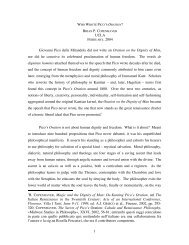Manifesto of the Fascist Intellectuals
Manifesto of the Fascist Intellectuals
Manifesto of the Fascist Intellectuals
Create successful ePaper yourself
Turn your PDF publications into a flip-book with our unique Google optimized e-Paper software.
MANIFESTO OF THE FASCIST INTELLECTUALS<br />
Origins<br />
Fascism is a recent movement and an ancient movement <strong>of</strong> <strong>the</strong> Italian spirit, deeply<br />
bound up with <strong>the</strong> history <strong>of</strong> <strong>the</strong> Italian nation, though not without meaning and interest<br />
for all o<strong>the</strong>r nations. Its origins go back to about 1919 when a band <strong>of</strong> men, returned<br />
from <strong>the</strong> trenches and resolved to fight vigorously against <strong>the</strong> demo-socialist politics that<br />
<strong>the</strong>n prevailed, ga<strong>the</strong>red around Benito Mussolini. The o<strong>the</strong>r politicians saw only <strong>the</strong><br />
immediate material effects <strong>of</strong> <strong>the</strong> Great War from which <strong>the</strong> Italian people had emerged<br />
victorious but exhausted. If <strong>the</strong>y did not openly deny its moral value, <strong>the</strong>y let it go to<br />
waste by representing it to <strong>the</strong> Italians, from a petty individualist and utilitarian point <strong>of</strong><br />
view, as a tally <strong>of</strong> sacrifices for which each person had to be compensated in proportion<br />
to <strong>the</strong> damage suffered. The result was a presumptuous and threatening opposition <strong>of</strong><br />
private interests to <strong>the</strong> State, a disregard for its authority, a loss <strong>of</strong> prestige for <strong>the</strong> King<br />
and <strong>the</strong> Army – symbols <strong>of</strong> <strong>the</strong> nation at a level higher than individuals and <strong>the</strong> various<br />
categories <strong>of</strong> citizens – an unleashing <strong>of</strong> passions and baser instincts, an inciting <strong>of</strong> social<br />
fragmentation, <strong>of</strong> moral decadence, <strong>of</strong> a selfish and irresponsible spirit <strong>of</strong> rebellion<br />
against all law and discipline.<br />
The individual against <strong>the</strong> state – an expression typical <strong>of</strong> <strong>the</strong> political side <strong>of</strong> <strong>the</strong> spiritual<br />
corruption that could not abide any higher norm for human life which might vigorously<br />
rule and constrain <strong>the</strong> attitudes and thoughts <strong>of</strong> individuals. In its origins, however,<br />
Fascism was a political and a moral movement. Its politics was like a gymnasium <strong>of</strong> selfdenial,<br />
a campaign for <strong>the</strong> sacrifice <strong>of</strong> <strong>the</strong> individual to an idea in which <strong>the</strong> individual<br />
might find his life’s purpose, his freedom and his entire law – <strong>the</strong> idea which is <strong>the</strong><br />
Fa<strong>the</strong>rland, an ideal which is realized historically without ever being exhausted, a specific<br />
and well-defined historical tradition <strong>of</strong> civilization, but a tradition that never remains in<br />
<strong>the</strong> past as a dead memory but becomes a personal force in <strong>the</strong> citizen’s mind, aware that<br />
<strong>the</strong>re is a goal to attain, a tradition which is <strong>the</strong>refore a mission.<br />
Fascism and <strong>the</strong> State<br />
This is <strong>the</strong> source <strong>of</strong> <strong>the</strong> religious character <strong>of</strong> Fascism.<br />
Its religious and <strong>the</strong>refore intransigent character explains <strong>the</strong> method that Fascism used in<br />
its struggle during <strong>the</strong> four years from 1919 to 1922. <strong>Fascist</strong>s were a minority in <strong>the</strong><br />
country and in Parliament, where a small, core group arrived after <strong>the</strong> elections <strong>of</strong> 1921.<br />
The constitutional State was <strong>the</strong>refore anti-<strong>Fascist</strong>, as it had to be, since it was <strong>the</strong> State<br />
<strong>of</strong> <strong>the</strong> majority, and it was precisely this State that called itself liberal which stood<br />
opposed to Fascism.<br />
The State was liberal, but its liberalism was <strong>the</strong> agnostic and acquiescent kind that<br />
understands only external freedom – <strong>the</strong> State which is liberal because it remains outside<br />
<strong>the</strong> free citizen’s mind as if it were a mechanical system apart from <strong>the</strong> activity <strong>of</strong> each<br />
individual. Although <strong>the</strong> representatives <strong>of</strong> hybrid socialism – democratic and
parliamentary – had adapted <strong>the</strong>mselves, even in Italy, to this individualist version <strong>of</strong> <strong>the</strong><br />
idea <strong>of</strong> politics, this State was plainly not what socialists yearned for. Nor was it <strong>the</strong><br />
State whose idea had worked so forcefully in <strong>the</strong> heroic Italian era <strong>of</strong> our Risorgimento,<br />
when <strong>the</strong> State rose out <strong>the</strong> work <strong>of</strong> a small minority streng<strong>the</strong>ned by <strong>the</strong> power <strong>of</strong> an<br />
idea to which individuals yielded in various ways: its basis was <strong>the</strong> great project <strong>of</strong><br />
making people who had gained <strong>the</strong>ir independence and unity into Italians.<br />
Embattled against this State, Fascism took strength from its idea, which attracted a<br />
rapidly growing number <strong>of</strong> <strong>the</strong> young because <strong>of</strong> <strong>the</strong> fascination that comes from any<br />
religious idea that calls for sacrifice. It became <strong>the</strong> party <strong>of</strong> <strong>the</strong> young – just as Mazzini’s<br />
Young Italy grew out <strong>of</strong> a similar political and moral need after <strong>the</strong> events <strong>of</strong> 1831.<br />
That party also had its Hymn <strong>of</strong> Youth, which <strong>Fascist</strong>s sing joyously from an exultant<br />
heart.<br />
And like Mazzini’s Young Italy, Fascism became <strong>the</strong> faith <strong>of</strong> all Italians who were<br />
<strong>of</strong>fended by <strong>the</strong> past and eager for renewal. A faith, like any faith in collision with a<br />
reality, which comes from breaking up and melting in <strong>the</strong> crucible <strong>of</strong> new energies and<br />
being reshaped in keeping with <strong>the</strong> new ideal, ardent and intransigent.<br />
It was <strong>the</strong> same faith that ripened in <strong>the</strong> trenches and in a deep change <strong>of</strong> heart about <strong>the</strong><br />
sacrifice <strong>of</strong>fered on <strong>the</strong> battlefields for <strong>the</strong> only purpose that could justify it – <strong>the</strong> life and<br />
greatness <strong>of</strong> <strong>the</strong> Fa<strong>the</strong>rland – a faith <strong>of</strong> energy and violence, disinclined to respect<br />
anything that opposed <strong>the</strong> life and greatness <strong>of</strong> <strong>the</strong> Fa<strong>the</strong>rland.<br />
Thus arose <strong>the</strong> squadrons, a young people’s movement that was resolute and armed.<br />
They wore black shirts and organized <strong>the</strong>mselves militarily, breaking <strong>the</strong> law in order to<br />
set up a new law, a force armed against <strong>the</strong> State to establish <strong>the</strong> new State.<br />
The squadrons moved against <strong>the</strong> fragmented anti-nationalist forces whose activity<br />
culminated in <strong>the</strong> general strike <strong>of</strong> July, 1922, and finally risked an uprising on October<br />
28, 1922, when armed columns <strong>of</strong> <strong>Fascist</strong>s marched on Rome after occupying public<br />
buildings in <strong>the</strong> provinces. Some died in <strong>the</strong> March on Rome, before and after it reached<br />
its goal, especially in <strong>the</strong> Po Valley. Like all bold actions with deep moral content, <strong>the</strong><br />
March ended first with amazement, <strong>the</strong>n admiration and at last with universal acclaim. It<br />
thus seemed that at one stroke <strong>the</strong> Italian people had rediscovered <strong>the</strong>ir enthusiastic pre-<br />
War unanimity, yet this feeling was even more vibrant because people realized that<br />
victory had been won and that a new, refreshing wave <strong>of</strong> faith had come to revitalize <strong>the</strong><br />
victorious nation on its hard new path toward <strong>the</strong> urgent restoration <strong>of</strong> its financial and<br />
moral strength.<br />
<strong>Fascist</strong> Government<br />
The squadrons and <strong>the</strong> law-breaking stopped, and Fascism outlined <strong>the</strong> elements <strong>of</strong> <strong>the</strong><br />
regime that it wished to see. Between October 29 and 30, <strong>the</strong> fifty thousand blackshirts<br />
who had marched on <strong>the</strong> capital from <strong>the</strong> provinces left Rome in perfect order. They left
after parading before His Majesty <strong>the</strong> King, and <strong>the</strong>y left at a sign from <strong>the</strong> Duce, who<br />
became <strong>the</strong> head <strong>of</strong> Government and <strong>the</strong> soul <strong>of</strong> <strong>the</strong> new Italy that Fascism hoped for.<br />
Was <strong>the</strong> revolution over? In a sense, yes: <strong>the</strong> squadrons no longer had a reason to exist.<br />
The Voluntary Militia for National Security was formed to incorporate former squadron<br />
members into <strong>the</strong> State’s armed forces. But <strong>the</strong> State is not <strong>the</strong> Government and <strong>the</strong><br />
Government was still waiting, amidst <strong>the</strong> consensus <strong>of</strong> <strong>the</strong> great majority <strong>of</strong> Italians that<br />
<strong>the</strong>y saw Fascism as <strong>the</strong> most potent political force, <strong>the</strong> one capable <strong>of</strong> expressing all <strong>the</strong><br />
strength <strong>of</strong> <strong>the</strong> nation’s heart and giving it <strong>the</strong> discipline for <strong>the</strong> change in legislation that<br />
<strong>the</strong> State now needed to find <strong>the</strong> form best suited to <strong>the</strong> social trends and spiritual needs<br />
<strong>of</strong> <strong>the</strong> Italian people.<br />
This transformation goes on gradually in <strong>the</strong> midst <strong>of</strong> perfect public order, under a strict<br />
financial regime which has put <strong>the</strong> unstable post-War budget back in balance by<br />
reorganizing <strong>the</strong> army, <strong>the</strong> judiciary and <strong>the</strong> educational institutions without wobbling or<br />
wavering, even while <strong>the</strong>re has been, and still is, plenty <strong>of</strong> vacillation in public opinion,<br />
an opinion violently agitated by a public press whose rigidified opposition becomes all<br />
<strong>the</strong> more furious as it grows more hopeless about any possibility <strong>of</strong> returning to <strong>the</strong> past.<br />
The press takes advantage <strong>of</strong> every mistake and every accident to stir <strong>the</strong> people up<br />
against <strong>the</strong> difficult, constructive and unrelenting work <strong>of</strong> <strong>the</strong> new Government.<br />
But foreigners coming to Italy have crossed <strong>the</strong> ring <strong>of</strong> flame drawn around <strong>Fascist</strong> Italy<br />
by <strong>the</strong> defensive fire <strong>of</strong> ferocious propaganda, written and spoken, internal and external,<br />
from Italians and non-Italians, which has tried to isolate <strong>Fascist</strong> Italy by slandering it as a<br />
country fallen into <strong>the</strong> hands <strong>of</strong> <strong>the</strong> most violent and cynical power. As foreigners have<br />
been able to see this Italy with <strong>the</strong>ir own eyes and as <strong>the</strong>y listen with <strong>the</strong>ir own ears to <strong>the</strong><br />
new Italians living <strong>the</strong>ir material and moral lives, <strong>the</strong>y have come to envy <strong>the</strong> public<br />
order that prevails today in Italy. They have become interested in <strong>the</strong> spirit that strives<br />
every day to gain more mastery <strong>of</strong> this well-regulated mechanism, and <strong>the</strong>y have begun<br />
to sense that here beats a heart, one full <strong>of</strong> humanity even if agitated by <strong>the</strong> frustrations <strong>of</strong><br />
patriotic passion. The Fa<strong>the</strong>rland <strong>of</strong> <strong>the</strong> <strong>Fascist</strong> is also <strong>the</strong> Fa<strong>the</strong>rland that lives and<br />
moves in <strong>the</strong> heart <strong>of</strong> every civic person, <strong>the</strong> Fa<strong>the</strong>rland that stirred feelings everywhere<br />
in <strong>the</strong> tragedy <strong>of</strong> <strong>the</strong> War and now stands vigilant in every region – must stand vigilant to<br />
protect its sacred interests even after <strong>the</strong> War, indeed, as consequence <strong>of</strong> <strong>the</strong> War that no<br />
one any longer believes to be <strong>the</strong> last.<br />
This Fa<strong>the</strong>rland, moreover, is a reconsecration <strong>of</strong> traditions and institutions that endure in<br />
civilization, in <strong>the</strong> flux and perpetuity <strong>of</strong> tradition. It is also a school for <strong>the</strong><br />
subordination <strong>of</strong> <strong>the</strong> particular and inferior to <strong>the</strong> universal and immortal. It is respect for<br />
law and discipline. It is freedom, but freedom to be won through law, freedom<br />
established by renouncing all petty willfulness and wasteful, irrational ambition. It is an<br />
austere conception <strong>of</strong> life and a religious gravity that does not paint grand ideals by<br />
banishing <strong>the</strong>m from this world, where <strong>the</strong> hard work <strong>of</strong> making life ideal goes on by<br />
expressing one’s own convictions in action and in words. These words <strong>the</strong>mselves are<br />
actions that bind <strong>the</strong> person who speaks <strong>the</strong>m, and with him <strong>the</strong>y also bind <strong>the</strong> world <strong>of</strong>
which he is a living, responsible part at every moment <strong>of</strong> time, in every secret that <strong>the</strong><br />
mind brea<strong>the</strong>s.<br />
This ideal is an ideal, but it is an ideal for which a struggle goes on in Italy today, those<br />
very harsh conflicts that show how serious things are and that <strong>the</strong>re is a faith in people’s<br />
hearts. Fascism, like any <strong>of</strong> <strong>the</strong> great movements, grows stronger as it becomes more<br />
able to attract and absorb, more effective and engaged in <strong>the</strong> workings <strong>of</strong> minds, ideas,<br />
interests and institutions – briefly, in <strong>the</strong> living fabric <strong>of</strong> <strong>the</strong> Italian people. And so <strong>the</strong><br />
point is no longer to count and weigh each person but to look to <strong>the</strong> idea and to value <strong>the</strong><br />
idea which, like any true or living idea, is endowed with a power <strong>of</strong> its own and has been<br />
made not by human beings but for <strong>the</strong>m.
MANIFESTO OF THE ANTI-FASCIST INTELLECTUALS: A REPLY BY ITALIAN AUTHORS,<br />
PROFESSORS AND JOURNALISTS TO THE MANIFESTO OF THE FASCIST INTELLECTUALS<br />
<strong>Fascist</strong> intellectuals meeting in Bologna have addressed a manifesto to intellectuals <strong>of</strong> all<br />
nations in order to explain and defend <strong>the</strong> policies <strong>of</strong> <strong>the</strong> <strong>Fascist</strong> party to <strong>the</strong>m. In setting<br />
out on so great an enterprise, <strong>the</strong>se eager gentlemen must not have recollected a similar<br />
and celebrated manifesto announced to <strong>the</strong> world by German intellectuals at <strong>the</strong> start <strong>of</strong><br />
<strong>the</strong> War in Europe – a manifesto greeted by universal disapproval at <strong>the</strong> time and later<br />
considered a mistake by <strong>the</strong> Germans <strong>the</strong>mselves.<br />
<strong>Intellectuals</strong>, students <strong>of</strong> art and science, exercise <strong>the</strong>ir rights and do <strong>the</strong>ir duty when <strong>the</strong>y<br />
join a party and serve it faithfully. But as intellectuals <strong>the</strong>ir sole duty is to use <strong>the</strong> work<br />
<strong>of</strong> research and criticism to elevate all people and all parties alike to a higher spiritual<br />
level so that <strong>the</strong>y can fight <strong>the</strong> battles that <strong>the</strong>y must with ever more positive results. To<br />
breach <strong>the</strong>se boundaries <strong>of</strong> <strong>the</strong> <strong>of</strong>fice assigned to <strong>the</strong>m, to contaminate politics and<br />
literature, politics and science, is an error that can scarcely be called munificent when, as<br />
in this case, it happens by encouraging deplorable acts <strong>of</strong> violence and insolence and by<br />
suppressing freedom <strong>of</strong> <strong>the</strong> press.<br />
And this action taken by <strong>the</strong> <strong>Fascist</strong> intellectuals does not even respond with much<br />
sensitivity to <strong>the</strong> Fa<strong>the</strong>rland, for it is not right to submit <strong>the</strong> Fa<strong>the</strong>rland’s troubles to <strong>the</strong><br />
judgment <strong>of</strong> foreigners, who do not take <strong>the</strong> trouble (naturally, as it happens) to look<br />
beyond <strong>the</strong> various special political interests <strong>of</strong> <strong>the</strong>ir own nations.<br />
In substance what <strong>the</strong>y write is a piece <strong>of</strong> half-baked schoolwork where one finds<br />
intellectual confusions and ill-spun arguments at every point – trading <strong>the</strong> atomism <strong>of</strong><br />
certain types <strong>of</strong> nineteenth century political science, for example, for nineteenth century<br />
liberalism, treating anti-historical, abstract and ma<strong>the</strong>matical democratism, in o<strong>the</strong>r<br />
words, as equivalent to <strong>the</strong> highly historical notion <strong>of</strong> free competition and alternation <strong>of</strong><br />
parties in power, whereby one makes progress, as if in small doses [quasi graduandolo],<br />
thanks to <strong>the</strong> opposition. Ano<strong>the</strong>r example is <strong>the</strong> facile and fevered rhetoric that<br />
celebrates <strong>the</strong> individual’s dutiful submission to <strong>the</strong> whole, as if that were <strong>the</strong> issue,<br />
ra<strong>the</strong>r than <strong>the</strong> capacity <strong>of</strong> authoritarian structures to guarantee <strong>the</strong> most effective moral<br />
advancement. Or ano<strong>the</strong>r, where we are betrayed [si perfidia] by a calamitous inability to<br />
distinguish economic institutions like unions from ethical institutions like legislative<br />
assemblies, thus courting <strong>the</strong> combining – or ra<strong>the</strong>r, <strong>the</strong> miscegenation – <strong>of</strong> <strong>the</strong> two types,<br />
which would end in <strong>the</strong>ir mutual corruption or, at least, <strong>the</strong>ir mutual obstruction. And we<br />
leave aside <strong>the</strong> arbitrary interpretations and manipulations <strong>of</strong> history, which are by now<br />
well-known.<br />
But <strong>the</strong> violence done by this piece to ideas and history counts for little in comparison to<br />
<strong>the</strong> abuse <strong>of</strong> <strong>the</strong> word “religion.” As <strong>the</strong> leading <strong>Fascist</strong> intellectuals understand things,<br />
we should now have found joy in a war <strong>of</strong> religion, in <strong>the</strong> exploits <strong>of</strong> a new evangel or a<br />
new apostolate against an old superstition, resisting to <strong>the</strong> death what dominates it and to<br />
which it still has to bow [alla quale dovrà piegarsi] – and <strong>the</strong>y take this to be proven by<br />
<strong>the</strong> hatred and spite that now makes Italians rage against Italians as never before. This is
what <strong>the</strong>y are calling a disagreement about religion: <strong>the</strong> hatred and spite provoked by a<br />
party which denies that elements <strong>of</strong> o<strong>the</strong>r parties are Italian and insults <strong>the</strong>m as<br />
foreigners, by that very act making itself a foreigner and oppressor in <strong>the</strong> eyes <strong>of</strong> <strong>the</strong><br />
o<strong>the</strong>rs and <strong>the</strong>reby introducing into <strong>the</strong> life <strong>of</strong> <strong>the</strong> Fa<strong>the</strong>rland <strong>the</strong> feelings and habits that<br />
go along with such conflicts. Using <strong>the</strong> word ‘religion’ to dignify <strong>the</strong> suspicion and<br />
animosity which has been sown everywhere, which has deprived even university students<br />
<strong>of</strong> <strong>the</strong> trusting sense <strong>of</strong> bro<strong>the</strong>rhood that <strong>the</strong>y used to have when <strong>the</strong>y shared youthful<br />
ideals, turning <strong>the</strong>m against one ano<strong>the</strong>r in fake clashes – to tell <strong>the</strong> truth, this sounds like<br />
a ra<strong>the</strong>r sorry joke.<br />
Whatever <strong>the</strong> new evangel might be, <strong>the</strong> new religion, <strong>the</strong> new faith, one cannot tell from<br />
<strong>the</strong> text <strong>of</strong> this wordy manifesto. As a practical matter, however, what its mute eloquence<br />
reveals to an objective observer is a bizarre and incoherent blend <strong>of</strong> appeals to authority<br />
and demagoguery; a pr<strong>of</strong>ession <strong>of</strong> reverence for <strong>the</strong> law and violation <strong>of</strong> <strong>the</strong> laws; ultramodern<br />
ideas and musty old notions; absolutist attitudes and Bolshevik dispositions;<br />
flattery for <strong>the</strong> Catholic Church and denials <strong>of</strong> belief; a dread <strong>of</strong> culture and sterile starts<br />
at a culture deprived <strong>of</strong> its premisses; mystical mawkishness and cynicism. And even if<br />
<strong>the</strong>re were any plausible proposals for <strong>the</strong> present government to enact or undertake,<br />
<strong>the</strong>re is nothing in <strong>the</strong>m to brag about, no innovative product to identify a new political<br />
system that would be named ‘Fascism.’<br />
For this chaotic and incomprehensible religion, <strong>the</strong>n, we are not inclined to abandon our<br />
old faith, <strong>the</strong> faith that for two and a half centuries has been <strong>the</strong> soul <strong>of</strong> a resurgent Italy<br />
and a modern Italy, <strong>the</strong> faith whose ingredients are love <strong>of</strong> truth; hope for justice; a<br />
generous human and civic sense; zeal for intellectual and moral education; and eagerness<br />
for freedom, which is <strong>the</strong> strength and security on which all progress depends. When we<br />
look back at images <strong>of</strong> <strong>the</strong> people <strong>of</strong> <strong>the</strong> Risorgimento, those who labored, suffered and<br />
died for Italy, <strong>the</strong>ir faces seem angry and upset at <strong>the</strong> words that are said and <strong>the</strong> things<br />
that are done by our Italian adversaries, and because we are steadfast in <strong>the</strong>ir cause we<br />
take <strong>the</strong> warnings seriously. Our faith is no abstract, artificial contrivance, no mental<br />
obsession caused by <strong>the</strong>ories poorly supported or poorly understood. It is <strong>the</strong> possession<br />
<strong>of</strong> a tradition which has become an emotional disposition and an intellectual or moral<br />
structure.<br />
In <strong>the</strong>ir manifesto <strong>the</strong> <strong>Fascist</strong> intellectuals repeat <strong>the</strong> hackneyed phrase that Italy’s<br />
Risorgimento was <strong>the</strong> work <strong>of</strong> a minority, not mentioning <strong>the</strong> weakness <strong>of</strong> our political<br />
and social makeup on this very point. Indeed, it almost seems that <strong>the</strong>y take satisfaction<br />
when most citizens <strong>of</strong> Italy today, faced with disagreements between Fascism and its<br />
opponents, seem to be indifferent – at <strong>the</strong> least. Liberals have never been satisfied with<br />
such a thing, and <strong>the</strong>y have tried with all <strong>the</strong>ir power to have an ever-growing number <strong>of</strong><br />
Italians called to public life. This was <strong>the</strong> main reason for some <strong>of</strong> <strong>the</strong>ir most<br />
controversial actions, such as <strong>the</strong> granting <strong>of</strong> universal suffrage. Even <strong>the</strong> sympathy with<br />
which many Liberals greeted <strong>the</strong> <strong>Fascist</strong> movement in its early days implied, among o<strong>the</strong>r<br />
things, <strong>the</strong> hope that it would introduce fresh new forces into political life, forces <strong>of</strong><br />
renewal and (why not?) forces <strong>of</strong> conservation. But <strong>the</strong>y never considered keeping <strong>the</strong><br />
bulk <strong>of</strong> <strong>the</strong> nation inert and indifferent, buying <strong>the</strong>m <strong>of</strong>f with various material goods.
They knew that doing so would have betrayed <strong>the</strong> purposes <strong>of</strong> <strong>the</strong> Italian Risorgimento<br />
and would have restored <strong>the</strong> evil devices <strong>of</strong> absolute and quietist governments.<br />
Even now, nei<strong>the</strong>r this putative indifference and inertia nor <strong>the</strong> obstacles that block <strong>the</strong><br />
path to freedom lead us to despair or resignation. What matters is to know that what one<br />
wants and should want is something intrinsically good. The present political struggle in<br />
Italy, because it presents such great contrasts, will serve to awaken our people and give<br />
<strong>the</strong>m a more concrete understanding <strong>of</strong> <strong>the</strong> value <strong>of</strong> Liberal policies and methods, causing<br />
people to have a more conscious sense <strong>of</strong> <strong>the</strong>ir desire for <strong>the</strong>m. One day, perhaps, people<br />
will look serenely at <strong>the</strong> past and conclude that <strong>the</strong> ordeal we now endure, harsh and<br />
painful for us, was a stage that Italy had to go through in order to revive its life as a<br />
nation, complete its political education, and learn a harder lesson about its duties as a<br />
civil society.



